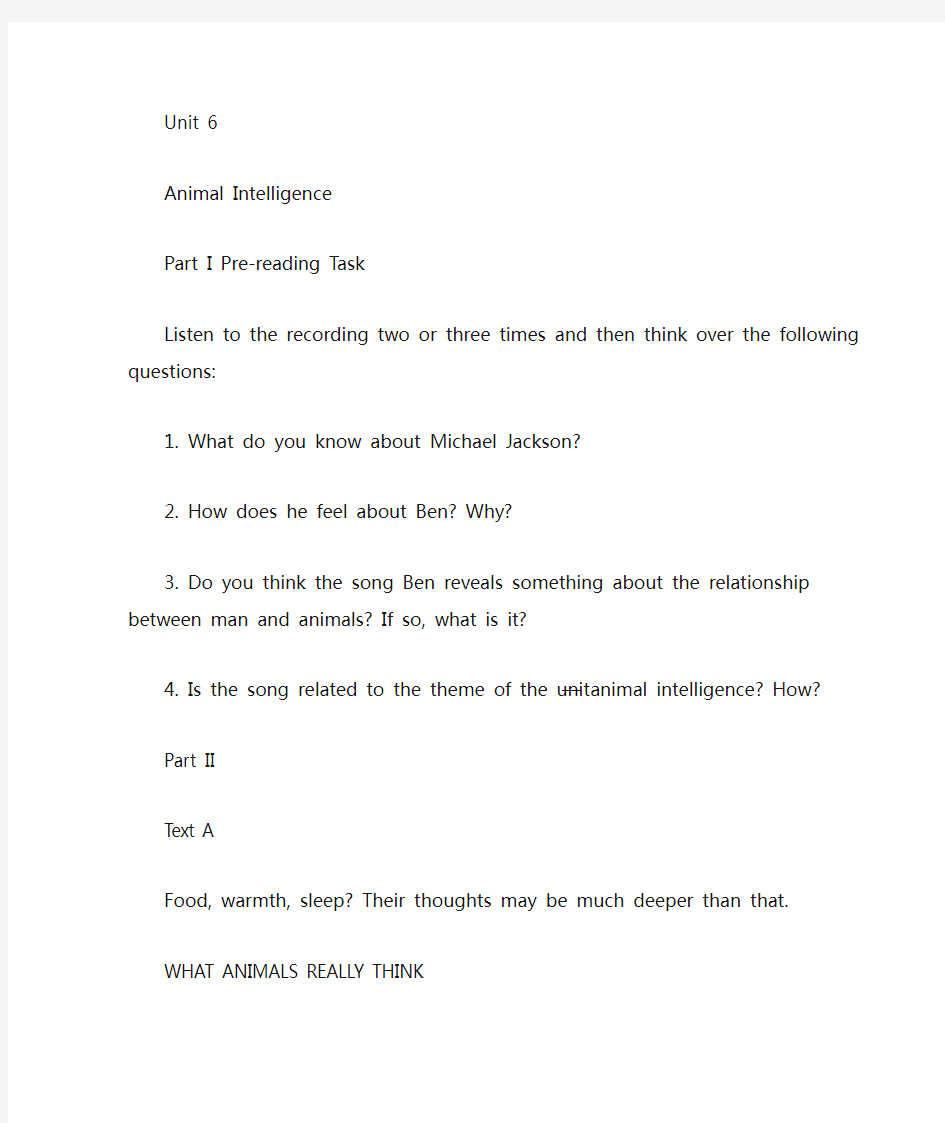
全新版大学英语第一册 6
- 格式:doc
- 大小:33.00 KB
- 文档页数:10


Unit 6
Animal Intelligence
Part I Pre-reading Task
Listen to the recording two or three times and then think over the following questions:
1. What do you know about Michael Jackson?
2. How does he feel about Ben? Why?
3. Do you think the song Ben reveals something about the relationship between man and animals? If so, what is it?
4. Is the song related to the theme of the unit — animal intelligence? How?
Part II
Text A
Food, warmth, sleep? Their thoughts may be much deeper than that.
WHAT ANIMALS REALLY THINK
Euqene Linden
Over the years, I have written extensively about animal-intelligence experiments and the controversy that surrounds them. Do animals really have thoughts, what we call consciousness? Wondering whether there might be better ways to explore animal intelligence than experiments designed to teach human signs, I realized what now seems obvious: if animals can think, they will probably do their best thinking when it serves their own purposes, not when scientists ask them to.
And so I started talking to vets, animal researchers, zoo keepers. Most do not study animal intelligence, but they encounter it, and the lack of it, every day. The stories they tell us reveal what I'm convinced is a new window on animal intelligence: the kind of mental feats animals perform when dealing with captivity and the dominant species on the planet — humans.
Let's Make a Deal
Consider the time Charlene Jendry, a conservationist at the Columbus Zoo, learned that a female gorilla named Colo was handling a suspicious object. Arriving on the scene, Jendry offered Colo some peanuts, only to be met with a blank stare. Realizing they were negotiating, Jendry raised the stakes and offered a piece of pineapple. At this point, while maintaining
eye contact, Colo opened her hand and revealed a key chain.
Relieved it was not anything dangerous or valuable, Jendry gave Colo the pineapple. Careful bargainer that she was, Colo then broke the key chain and gave Jendry a link, perhaps figuring. Why give her the whole thing if I can get a bit of pineapple for each piece?
If an animal can show skill in trading one thing for another, why not in handling money? One orangutan named Chantek did just that in a
sign-language study undertaken by anthropologist Lyn Miles at the University of Tennessee. Chantek figured out that if he did tasks like cleaning his room, he'd earn coins to spend on treats and rides in Miles's car. But the orangutan's understanding of money seemed to extend far beyond simple dealings. Miles first used plastic chips as coins, but Chantek decided he could expand the money supply by breaking chips in two. When Miles switched to metal chips, Chantek found pieces of tin foil and tried to make copies.
Miles also tried to teach Chantek more virtuous habits such as saving and sharing. Indeed, when I caught up with the orangutan at Zoo Atlanta, where he now lives, I saw an example of sharing that anyone might envy. When Miles gave Chantek some grapes and asked him to share them, Chantek promptly ate all the fruit. Then, as if he'd just remembered he'd been asked to share, he handed Miles the stem.
Tale of a Whale
Why would an animal want to cooperate with a human? Behaviorists would say that animals cooperate when they learn it is in their interest to do so. This is true, but I don't think it goes far enough.
Gail Laule, a consultant on animal behavior, speaks of Orky, a killer whale, she knew. "Of all the animals I've worked with, he was the most intelligent," she says. "He would assess a situation and then do something based on the judgments he made."
Like the time he helped save a family member. When Orky's mate, Corky, gave birth, the baby did not thrive at first, and keepers took the little whale out of the tank by stretcher for emergency care. Things began to go wrong when they returned the baby whale to the tank. As the workers halted the stretcher a few meters above the water, the baby suddenly began throwing up through its mouth. The keepers feared it would choke, but they could not reach the baby to help it.
Apparently sizing up the problem, Orky swam under the stretcher and allowed one of the men to stand on his head, something he'd never been trained to do. Then, using his tail to keep steady, Orky let the keeper reach up and release the 420-pound baby so that it could slide into the water within reach of help.
Primate Shell Game